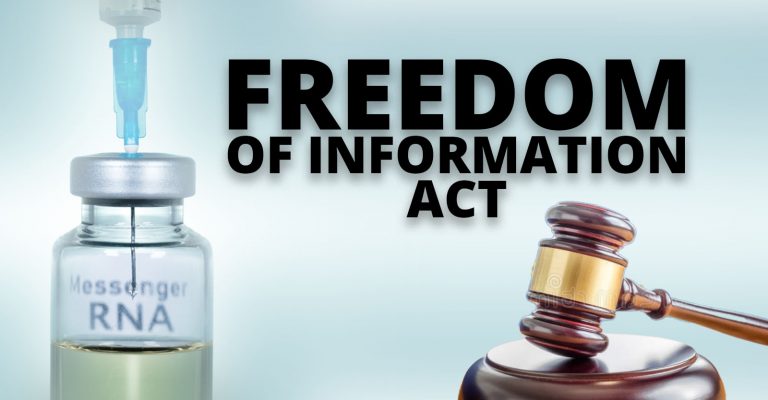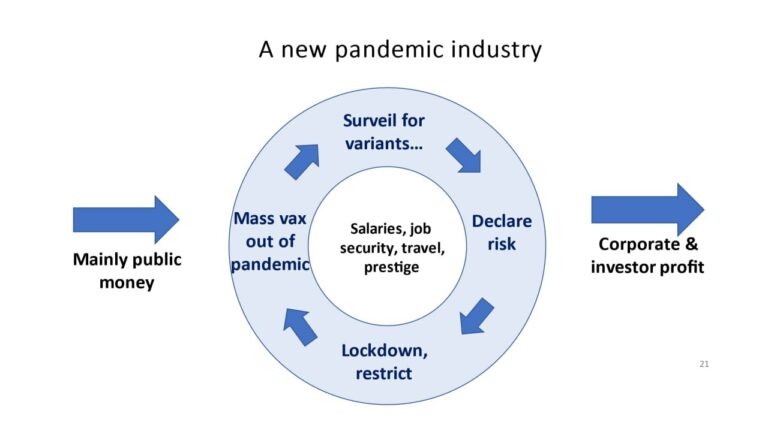France Could Make It a Crime to Criticize Government-Approved Medical Treatments
A controversial French bill that passed its first legislative hurdle would punish, with fines and jail time, any “provocation” to abstain from medical treatments like vaccines. Experts warn the “vague” law threatens free speech and the patient-doctor relationship.
A controversial proposed bill in France that seeks to outlaw criticism of medical interventions such as mRNA vaccines has passed its first legislative hurdle.
The French Assembly passed Bill 2157, “Aimed at strengthening the fight against sectarian abuses and improving support for victims,” on Feb. 14 in an 182-137 vote, according to a Feb. 15 report by FranceInfo. The legislation was first introduced on Nov. 15, 2023, and was subsequently fast-tracked.
Article 4 of the bill has garnered the most controversy. It states:
“Provocation to abandon or abstain from following therapeutic or prophylactic medical treatment is punishable by one year’s imprisonment and a fine of 15,000 euros [$16,216], when this abandonment or abstention is presented as beneficial for the health of the persons … [but may result in] serious consequences for their physical or psychological health …
“… When the provocation provided for in the first two paragraphs has been followed by effects, the penalties are increased to three years of imprisonment and a fine of 45,000 euros [$48,647].
“When these offenses are committed through the written or audiovisual press, the specific provisions of the laws which govern these matters are applicable with regard to the determination of the persons responsible.”
According to FranceInfo, the French Senate — which previously “withdrew the first version of [Article 4] at first reading in December, highlighting its legal fragility” — must now vote on an identical version of the bill. The Senate vote has not yet been scheduled.
France’s Council of State, which advises the French government on legislation, issued an opinion in November 2023 finding the proposed legislation redundant. The council said existing law already prohibits the illegal practice of medicine, deceptive commercial practices and endangering the lives of others.
The Council of State also questioned the bill’s constitutionality, arguing the restrictions in the law’s original wording were not “necessary, appropriate and proportionate” to the principles of freedom of expression and freedom of scientific debate protected by the French Constitution and the European Convention on Human Rights.
Opponents of the bill used the council’s opinion to defeat it in an initial assembly vote on Feb. 13, on the basis that its “vague” provisions might outlaw criticism of “pharmaceutical abuses.”
The assembly subsequently modified Article 4, adding language preventing legal consequences in instances where “clear and complete information” on possible health consequences are provided by practitioners and patients agree to follow them in a “free and informed” manner.
Members of French President Emmanuel Macron’s Renaissance party opposed the Feb. 13 rejection of the bill, FranceInfo reported. According to a separate FranceInfo report, the amended version of the bill passed Feb. 14 with the support of the PS (Socialist Party) “in particular.”
In January 2022, Macron said his COVID-19 strategy was to “piss off” the unvaccinated. Later that year he said he was standing by those remarks.
‘The potential for abuse is enormous’
According to FranceInfo, Article 4 “aims to fight against ‘charlatans’ and ‘2.0 gurus’ who promote on the internet methods presented as ‘miracle solutions’ to cure serious illnesses such as cancer.”
The article cites examples including “raw foodism,” touted by some as a means of curing cancer. According to FranceInfo, “Many of the promoters of such practices are being sued by families of patients who died after rejecting conventional treatments in favor of these methods.”
Dr. David Bell, a public health physician, biotech consultant and former director of Global Health Technologies at Intellectual Ventures Global Good Fund, told The Defender that “Public health has a role to protect the public from charlatans” and to ensure “accurate and balanced information is available.”
However, he said people should have the legal right to decide for themselves “what is the best approach for their own situation.”
“This is the basis of post-World War II human rights and fundamental medical ethics,” Bell said. “Informed consent cannot happen if people presenting one side of an argument risk being sent to prison.”
Several experts who spoke with The Defender also warned about the risk the legislation poses to free speech.
Brian Hooker, Ph.D., senior director of science and research for Children’s Health Defense (CHD), said:
“This new legislation flies in the face of any type of free speech. It is also very dangerous as it prevents any type of alternative viewpoint on therapeutics or prophylactics.
“We know historically that pandemic countermeasures were essentially bad medicine for the individual and at the population level. Any measure hastily foisted on the public in France could lead to even more sickness and death.”
French independent journalist and science writer Xavier Bazin said he is “appalled by this attack on free speech.” He said the bill is “badly written” and as a result, “it is not yet clear what it outlaws exactly.” He said this creates a risk that courts may interpret the law in a particularly restrictive manner.
French scientist Xavier Azalbert, editor of the independent publication France Soir, told The Defender the legislation poses a risk to “our public liberties and freedom.”
“This bill is unacceptable as it is a slow but sure decrease in freedom of expression,” he said. “Whatever the government says they will curb, it will, one way or the other, apply it against those who have opposed the official narrative.”
Dr. Kat Lindley, president of the Global Health Project and director of the Global COVID Summit, told The Defender, “The European Union and countries within the union are tightening the screws on free speech and not only starting to censor the information on platforms like X but now interfering with the patient-physician relationship.”
“While their attention might have been limited to treatments deemed ‘unsafe’ … when do we stop allowing bureaucrats to interfere in the direct treatment of the people?” she asked. “The potential for abuse is enormous and this type of overreach must stop.”
Bell said freedom of medical expression is necessary for medical progress:
“Democracy, and the progress of science, are fully dependent on the ability to speak freely and express opinions contrary to the mainstream, or majority. Without this in medicine, we would still be advocating for frontal lobotomies and tens of thousands more may have died from Vioxx.”
Bill proponents targeted opponents of lockdowns, vaccine mandates
Some analysts argued the legislation does not outlaw criticism of medical interventions or pose a risk to people who are critical of vaccines or mRNA technology.
Writing for The Daily Sceptic, journalist Robert Kogon said the law’s application would be limited. “It is hard to see how any judge could interpret such provisions as applying to vaccines, whether mRNA-based or otherwise.”
Other experts disagreed. “If the law does not advocate this, why do they bring it forth?” Azalbert asked. “That is the question.”
Lindley expressed concern about those interpreting laws that use language like “therapeutic” or “prophylactic medical treatment/practice.”
“It is not a stretch to imagine that current and future mRNA products will be considered as ‘prophylactic medical practices’ by mainstream medicine and bureaucrats,” she said.
“As written, this law represents a clear assault on the patient-physician relationship,” she added. “It will fundamentally change the practice of medicine.”
Writing on her Telegram channel, French scientist and author Hélène Banoun, Ph.D., said, “Who will decide on beneficial or harmful treatments? A judge? Members of parliament? The government? Doctors with conflicts of interest?”
In a press release, Bon Sens, a French independent citizens’ group focused on health matters, raised similar concerns, noting that while the text of the legislation no longer appears to threaten “a study or a published reasoned opinion casting doubt on the effectiveness of a treatment,” such rhetoric may still be “assessed subjectively” in court.
Bazin said France’s health minister during the COVID-19 pandemic, now a member of the French Assembly, has “specifically compared Dr. Didier Raoult to the ‘gurus’ this law is supposed to fight … simply because Raoult was against lockdowns, pro-early treatment and skeptical of universal vaccination.”
“This tells a lot about their intent,” Bazin said.
Azalbert warned that organizations like CHD “would be targeted as well.”
French oncologist Dr. Gérard Delépine told The Defender the legislation is “aimed at whistleblowers in medicine, in order to establish an official science [and] allowing Big Pharma to lie without consequence.”
Despite this threat to medical whistleblowers, Delépine said “virtually all” French mainstream media “have championed the law.”
Legislation faces legal, constitutional hurdles
According to Bazin, the legislation not only needs to pass the French Senate but also an examination by France’s Constitutional Council, which “might censure it.” He said the Constitutional Council often relies on opinions from the French Council of State, which found the original language of the legislation to be unconstitutional.
Azalbert said the bill may also be reviewed by a mixed commission of six Senators and six members of the French Assembly, who have to agree on the final text of the bill in the event it is rejected again by the Senate.
French law allows the government to step in if a bill is rejected twice, and can ask the French Assembly to “vote in last resort.”
Lindley said she hopes “the Senators will realize the potential far-reaching and devastating effects of this law.”
If passed, the legislation “will be challenged in court,” Bazin said, “because it probably violates the European Convention on Human Rights.”
Similarly, Delépine said, “Many citizens will fight to prevent this travesty and uphold the first word of our national motto, ‘Liberty.’”
“I’m one of them, and I’m convinced we’ll win,” he said. “The only battles lost in advance are the ones you don’t fight.”
Suggest a correction






